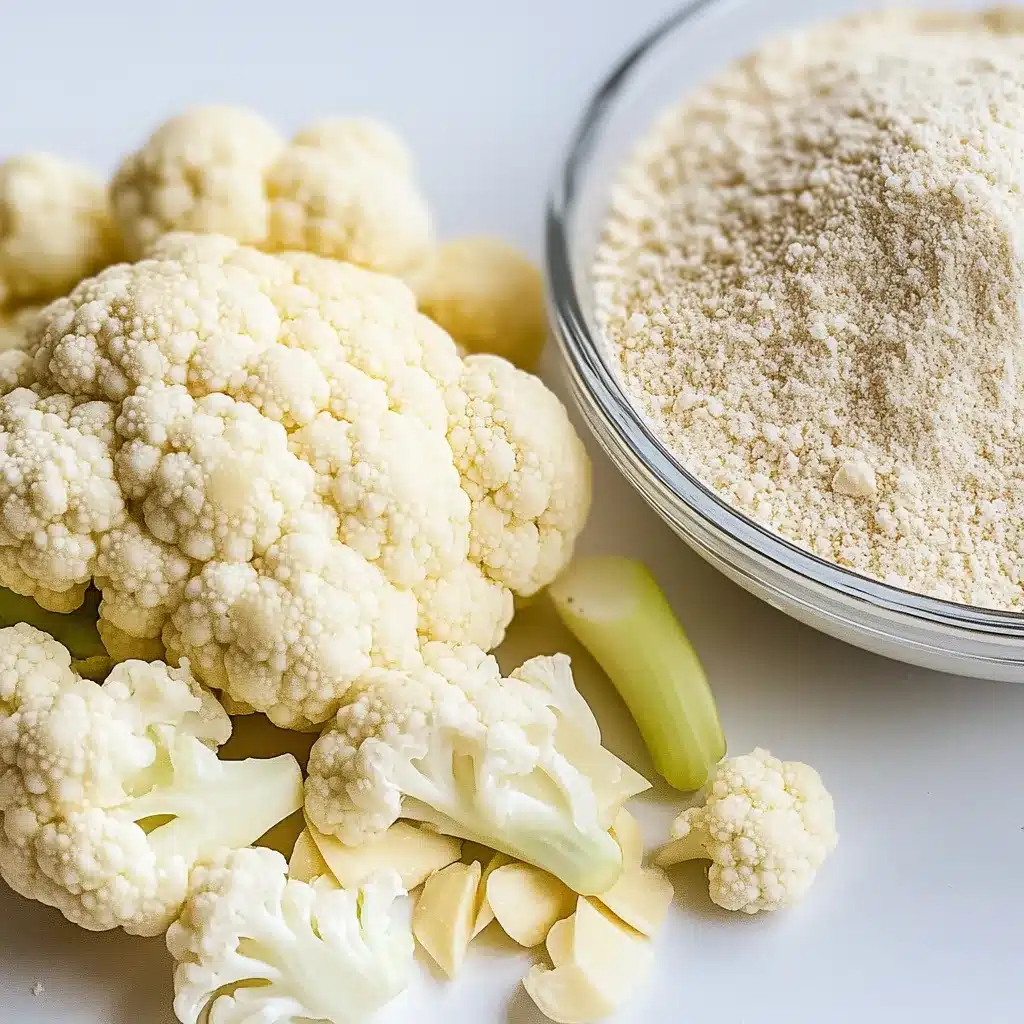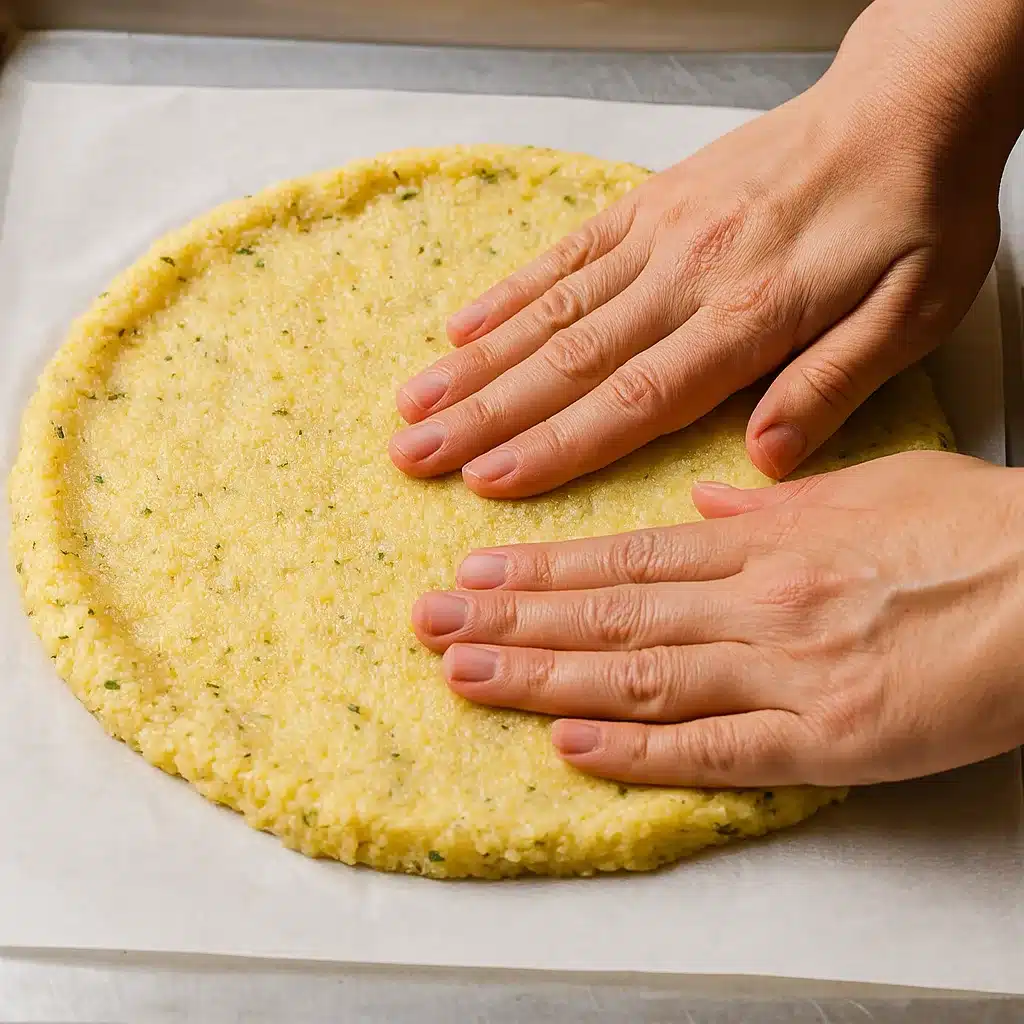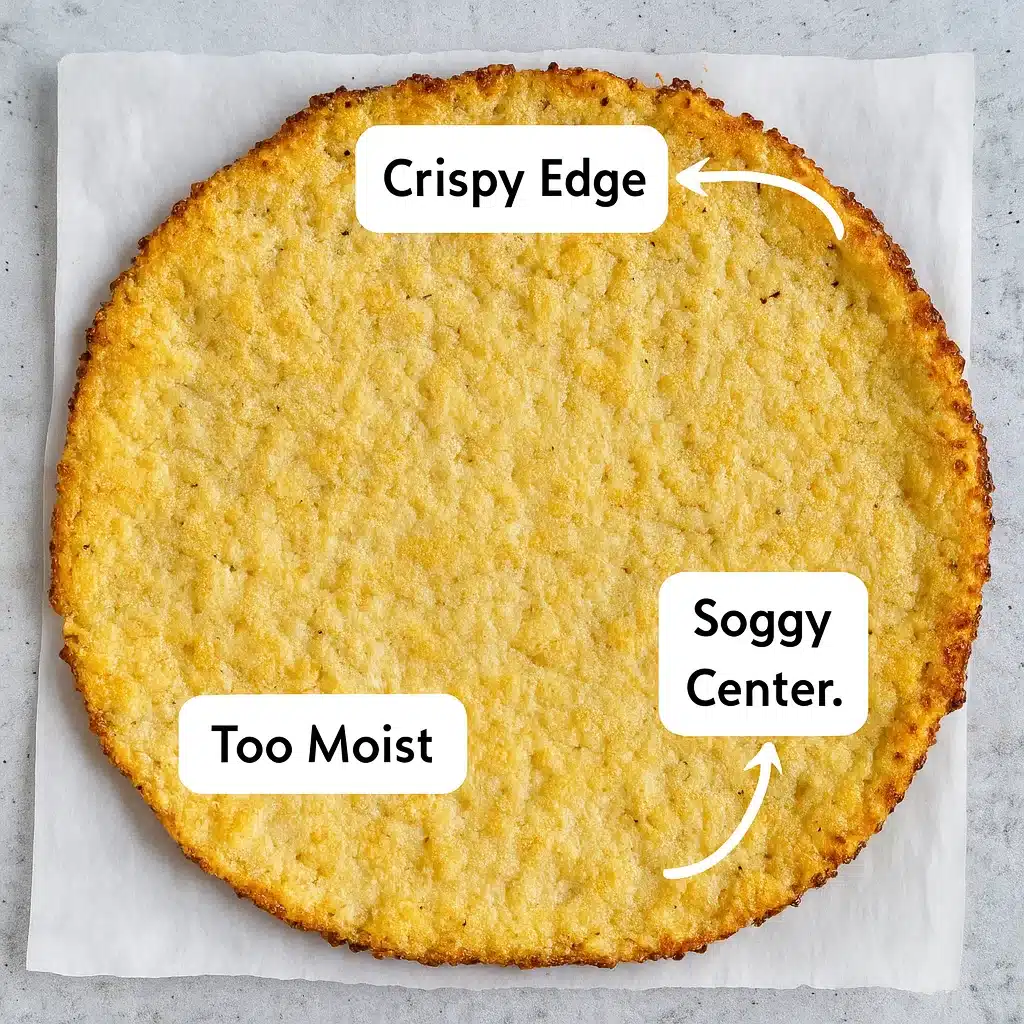Pizza lovers rejoice — you can now enjoy your favorite dish without the guilt. The cauliflower almond pizza crust is a revolutionary low-carb, gluten-free base that brings all the flavor with none of the bloat. Whether you’re following a keto diet, trying to cut carbs, or just want a lighter option, this crust is packed with nutrients and totally satisfying.

In this guide, we’ll dive into how to make it, troubleshoot common problems like sogginess or crumbling, and explore perfect topping ideas. Plus, you’ll get answers to frequently asked questions like whether almond flour can replace traditional flour, how to crisp it up like Trader Joe’s, and more.
Discover great ideas like keto cauliflower pizza crust recipe for more healthy options.
Table of Contents
What Is Cauliflower Almond Pizza Crust?
What makes cauliflower almond crust different from regular crusts?
Unlike traditional pizza crusts made with wheat flour, the cauliflower almond pizza crust uses finely riced cauliflower and almond flour as its base. This makes it naturally grain-free, gluten-free, and lower in carbs — ideal for people managing diabetes, eating keto, or avoiding gluten. Almond flour adds healthy fats and a nutty flavor, which blends perfectly with the light texture of cauliflower.
This crust doesn’t rely on yeast, so there’s no rising time. Instead, the mix is bound with egg and cheese, then pressed into a thin layer and baked until golden. The result is a chewy yet crisp texture with a mildly nutty, savory taste that doesn’t overpower your toppings.
Why is it popular in gluten-free and keto diets?
The popularity of cauliflower almond pizza crust is no coincidence — it checks all the boxes for modern health-conscious eaters:
| Feature | Benefit |
|---|---|
| Low in carbohydrates | Helps maintain ketosis |
| Gluten-free | Safe for celiac and gluten-free diets |
| High in fiber | Promotes digestion and fullness |
| Rich in protein (with cheese & egg) | Adds satiety to plant-based meals |
| Versatile base | Pairs well with most toppings |
Many pizza crust alternatives are either too crumbly or flavorless, but combining cauliflower with almond flour creates a superior structure and depth of flavor that rivals the real thing. That’s why it has become a staple in low-carb recipe communities.
Print
Cauliflower Almond Pizza Crust recipe
- Prep Time: 15 minutes
- Cook Time: 30 minutes
- Total Time: 45 minutes
- Yield: 1 thin-crust pizza
- Category: Main Course
- Method: Baked
- Cuisine: American
Description
This Cauliflower Almond Pizza Crust is a gluten-free, low-carb alternative to traditional pizza dough. Made with fresh cauliflower, almond flour, and savory herbs, it bakes into a crispy, golden crust that’s perfect for your favorite toppings. It’s easy to make, wholesome, and packed with flavor—ideal for anyone following a keto or grain-free diet.
Ingredients
- 1 head cauliflower, chopped
- 1 cup almond flour
- 3 eggs
- ½ teaspoon dried oregano
- ½ teaspoon dried thyme
- ½ teaspoon dried rosemary
- 1 dash salt
- 1 teaspoon all-purpose flour (for dusting pan)
Instructions
- Preheat oven to 450°F (230°C).
- Add chopped cauliflower to a food processor or blender and pulse until it resembles rice grains.
- Spread the riced cauliflower evenly on a baking sheet and roast for about 10 minutes, or until soft.
- Transfer the softened cauliflower to a large bowl. Add almond flour, eggs, oregano, thyme, rosemary, and salt. Mix until a dough forms and pulls together into a ball.
- Lightly dust a pizza pan with all-purpose flour. Spread the dough onto the pan using a spatula, shaping it into a thin crust.
- Bake in the preheated oven for 20 minutes, or until the crust is golden brown and the edges are crispy.
- Remove from oven and let cool slightly before adding your desired pizza toppings.
Notes
For a quicker method, cauliflower can be microwaved for 4 minutes instead of roasting. Flax eggs can be used for a vegan-friendly version. Substitute other flours like wheat flour for a firmer texture, but it will no longer be gluten-free.
Learn more about our gluten-free cauliflower pizza crust version that’s equally delicious.
Nutritional Benefits of Cauliflower and Almond Flour
Health benefits of cauliflower: vitamins, fiber, low-carb profile
Cauliflower isn’t just the base of a trendy food—it’s the star ingredient in cauliflower almond pizza crust, offering both nutrition and function. With just 25 calories per cup, it delivers big on nutrients without the carb overload. It’s especially ideal for people on low-carb or gluten-free diets.

Here’s what makes cauliflower a smart choice for your crust:
- Vitamin C supports your immune health and skin.
- Vitamin K plays a key role in bone strength and healing.
- Folate and choline are essential for cell repair and brain function.
- Fiber improves digestion and increases satiety.
- Low carbohydrate content helps stabilize blood sugar levels.
Because cauliflower has a neutral flavor, it lets the toppings shine while forming the ideal structure in a cauliflower almond pizza crust.
Why almond flour is a great low-carb, gluten-free flour choice
Almond flour is what elevates your crust from bland to brilliant. When combined with cauliflower, it transforms the dough into a cohesive, slightly chewy base that holds together beautifully. This is crucial for anyone trying to avoid soggy or crumbly results in their cauliflower almond pizza crust.
Here’s why almond flour is a powerhouse ingredient:
| Nutrient (per 1/4 cup) | Amount | Benefit |
|---|---|---|
| Calories | ~160 | Fuel for your body |
| Protein | ~6g | Helps with muscle growth and repair |
| Healthy Fats | ~14g | Keeps you full and supports heart health |
| Net Carbs | ~2g | Low-carb for keto and diabetic diets |
| Vitamin E | 40% DV | A natural antioxidant |
| Magnesium | 20% DV | Supports bone health and muscle function |
Almond flour isn’t just for baking—it’s one of the core ingredients that makes your cauliflower almond pizza crust a nutrient-rich, grain-free choice. Plus, it adds a satisfying, slightly nutty flavor that complements most pizza toppings beautifully.
Check out our detailed cauliflower pizza crust guide for deeper nutritional insights.
Ingredients Breakdown for the Perfect Cauliflower Almond Pizza Crust
Core ingredients: cauliflower, almond flour, cheese, egg
Making the perfect cauliflower almond pizza crust starts with choosing the right ingredients — and knowing how they work together. Each element plays a specific role in creating a crust that’s firm, flavorful, and satisfying.
Here’s what you’ll need:
- Cauliflower (1 medium head or 4 cups riced)
This is the bulk of the crust. Be sure to rice it finely and cook out the moisture for a firm base. - Almond flour (1/2 to 3/4 cup)
Almond flour adds structure and richness. It soaks up extra moisture while creating a chewy, bread-like texture that mimics traditional crust. - Egg (1 large)
This acts as the binder. Without it, your crust will fall apart. For a vegan alternative, flaxseed meal with water can sometimes be used, though it may alter crispness. - Cheese (1/2 to 1 cup shredded mozzarella or parmesan)
Cheese helps hold everything together and adds flavor. Mozzarella gives a soft bite, while parmesan adds sharpness and crunch. - Salt & Italian seasoning
A pinch of salt, garlic powder, and dried oregano go a long way in enhancing the flavor of your cauliflower almond pizza crust. - Optional: Psyllium husk or coconut flour (1-2 tbsp)
For those who want a firmer or thicker crust, adding psyllium husk improves flexibility and density.
Pro tip: The more moisture you remove from the cauliflower, the better your crust will hold. After steaming or microwaving, use a clean towel or cheesecloth to squeeze out every drop.
Optional seasonings and flavor enhancers to boost the taste
While the base recipe is neutral enough to match any topping, enhancing your cauliflower almond pizza crust with herbs and spices takes it to the next level. Consider mixing in:
- Minced garlic or onion powder for extra aroma
- Crushed red pepper flakes for a spicy kick
- Fresh herbs like basil or parsley for a fresh, earthy note
- Sun-dried tomato flakes for a savory umami twist
Here’s a simple ingredient cheat sheet:
| Ingredient | Purpose | Optional? |
|---|---|---|
| Cauliflower | Base and structure | No |
| Almond flour | Texture and binding | No |
| Egg | Binding agent | No |
| Cheese | Binding and flavor | No |
| Seasonings | Flavor enhancement | Yes |
| Psyllium husk/coconut flour | Firmness and flexibility | Yes |
Don’t miss our vegan-friendly variation — explore this vegan cauliflower pizza crust recipe.
How to Make Cauliflower Almond Pizza Crust at Home
Step-by-step instructions (including drying cauliflower properly)
Making your own cauliflower almond pizza crust at home is easier than you think. The trick lies in prepping your cauliflower the right way and baking it at the ideal temperature. Here’s how to do it step-by-step:
Ingredients:
- 1 medium head of cauliflower (or 4 cups riced)
- 1/2 cup almond flour
- 1 large egg
- 1/2 cup shredded mozzarella (or parmesan)
- 1/2 tsp salt
- 1 tsp Italian seasoning
- Optional: 1 tbsp psyllium husk for added firmness
Step 1: Rice the cauliflower
Break the cauliflower into florets and pulse in a food processor until you get a fine, rice-like texture. Don’t over-blend, or it will become mushy.
Step 2: Cook the cauliflower
Microwave the riced cauliflower for 5–7 minutes, or steam it until tender. Let it cool completely before handling.
Step 3: Squeeze out the moisture
Place the cooked cauliflower into a clean kitchen towel or cheesecloth and squeeze out as much water as possible. This is the most critical step for a non-soggy cauliflower almond pizza crust. The drier, the better.
Step 4: Mix your ingredients
In a large bowl, combine the dry cauliflower with almond flour, egg, cheese, and seasonings. Mix until it forms a dough-like consistency.
Step 5: Form the crust
Line a baking sheet with parchment paper. Spread the mixture into a circle about 1/4 inch thick. Don’t make it too thin or the edges may burn.
Step 6: Bake the crust
Bake in a preheated oven at 425°F (220°C) for 20–25 minutes, or until golden brown. Flip it halfway if you want extra crispness.
Step 7: Add toppings and rebake
Remove the crust from the oven, add your favorite toppings, and return it to bake for another 8–10 minutes until the cheese bubbles and browns.

Best tools and techniques for shaping and baking
Using the right tools can make the process easier and give your cauliflower almond pizza crust that pro-chef finish:
- Cheesecloth or nut milk bag: For maximum moisture removal
- Food processor: To get finely riced cauliflower in seconds
- Pizza stone or cast iron pan: For even heat distribution and crisp edges
- Parchment paper: Prevents sticking and keeps your crust intact
- Offset spatula: Helps spread the dough evenly
You can also experiment with baking methods like:
| Method | Result | Tip |
|---|---|---|
| Oven | Balanced and crispy | Bake directly on parchment |
| Air fryer | Crispier, faster cook | Make mini crusts to fit tray |
| Broiler finish | Charred edges, melty top | Use for final 2–3 minutes of baking |
Common Issues and Fixes with Cauliflower Pizza Crust
Why does cauliflower pizza crust fall apart?
If your cauliflower almond pizza crust is crumbling like dry sand, you’re not alone. A falling-apart crust is often due to too much moisture, not enough binding, or improper baking.
Here’s what causes it — and how to fix it:
| Problem | Cause | Fix |
|---|---|---|
| Crust falls apart when sliced | Too much water in cauliflower | Squeeze out more moisture using a cheesecloth |
| Crust is too crumbly | Not enough egg or cheese to bind | Add an extra egg or increase cheese slightly |
| Crust breaks when flipping | Flipped too early or too thin | Bake longer before flipping, and keep crust thicker |
| Crust sticks to parchment | No oil or low-quality paper | Use high-quality parchment or grease it slightly |
Pro Tip: After mixing your dough, let it sit for 5–10 minutes. This gives almond flour time to absorb excess moisture, helping the crust stay together.
Why is it often soggy — and how to prevent it
Nobody wants a floppy, soggy pizza crust. One of the most common complaints with any cauliflower almond pizza crust is that it lacks crunch. That sogginess usually stems from moisture that wasn’t dealt with upfront.
Here are the top tips to banish the sog:
- Squeeze cauliflower completely dry — You should get at least a 1/2 cup of water out of a medium head of cauliflower.
- Don’t skip pre-baking — Always bake the crust alone before adding toppings.
- Add almond flour generously — It soaks up remaining moisture and adds structure.
- Use parchment paper, not foil — Foil traps moisture underneath.
- Finish under the broiler — A few minutes under high heat crisps the surface without burning.
Still getting soggy crust? Try sprinkling a small amount of coconut flour (1 tbsp) into the mix—its ultra-absorbent texture can help firm things up fast.
Almond Flour Alternatives and Substitutions
Can almond flour replace all-purpose flour in other pizza crusts?
If you’re experimenting with low-carb baking, you might wonder if almond flour can stand in for traditional wheat flour. While it’s perfect for recipes like cauliflower almond pizza crust, it’s not a direct swap in conventional dough recipes.
Almond flour is gluten-free and high in fat, which means it lacks the structure that gluten provides. So when used in standard pizza dough, it requires extra binders like eggs or psyllium husk. In contrast, in a cauliflower almond pizza crust, the almond flour works in harmony with the cauliflower and cheese to create a stable, chewy base.
| Flour Type | Almond Flour Swap? | Notes |
|---|---|---|
| All-purpose flour | No (not 1:1) | Almond flour lacks gluten; needs more binders |
| Coconut flour | No | Use 1/4 the amount; it’s very absorbent |
| Cassava flour | Yes (with tweaks) | Nut-free but starchier; alters carb count |
For crusts that aim to be both low-carb and delicious, almond flour remains a favorite. Its role in cauliflower almond pizza crust isn’t just for structure — it contributes a lightly nutty flavor and golden crispness that’s hard to beat.
Best flour types for different diets and texture preferences
If almond flour isn’t your go-to—whether due to allergies, diet restrictions, or availability—there are excellent alternatives that can still work well in variations of cauliflower almond pizza crust or similar recipes.
1. Coconut Flour
- Keto-friendly and ultra-low-carb
- Soaks up moisture quickly, requiring fewer amounts
- Creates a firmer, crispier crust
2. Chickpea (Besan) Flour
- Protein-rich, fiber-dense
- Earthy flavor, best with bold toppings
- Slightly higher in carbs
3. Flaxseed Meal
- Adds fiber and omega-3s
- Great for vegan versions of cauliflower crust
- Needs pairing with other flours for texture
4. Psyllium Husk Powder
- Not technically a flour, but enhances flexibility
- Improves hold and chew in cauliflower almond pizza crust
5. Cassava Flour
- Soft, fluffy texture similar to wheat flour
- Grain-free and nut-free
- Ideal for paleo-friendly recipes
| Flour Type | Gluten-Free | Low-Carb | Texture | Works Well In |
|---|---|---|---|---|
| Almond Flour | Yes | Yes | Moist & chewy | Cauliflower almond pizza crust |
| Coconut Flour | Yes | Yes | Dense & crisp | Crispy keto crusts |
| Cassava Flour | Yes | No | Light & soft | Paleo-friendly pizza bases |
| Flaxseed Meal | Yes | Yes | Binds & thickens | Vegan cauliflower crust versions |
No matter your dietary needs, there’s a flour alternative that can work in or alongside cauliflower almond pizza crust. Just remember that each one behaves differently—so adjusting the liquids and binding agents is key.

Looking for inspiration? Try our versatile cauliflower pizza crust base suitable for all diets.
Conclusion: Why Cauliflower Almond Pizza Crust Should Be Your Go-To Guilt-Free Pizza Base
Whether you’re keto, gluten-free, diabetic, or just aiming to eat healthier, cauliflower almond pizza crust checks all the boxes. It’s low in carbs, high in flavor, and easy to customize with your favorite toppings. Almond flour adds a rich, nutty profile while also improving texture and helping bind everything together—resulting in a crust that actually holds up like the real thing.
The best part? You don’t have to sacrifice taste or satisfaction. With just a few simple ingredients and the right techniques, you can enjoy homemade pizza that’s crispy on the outside, tender in the middle, and 100% guilt-free.
From drying out your cauliflower properly to getting that perfect golden crisp, you now have all the tools to make a cauliflower almond pizza crust that’s every bit as indulgent as a traditional pie—minus the carbs and bloating.
Explore bold flavors, fresh ideas, and smart cooking hacks — all from Mr.Chef Recipes on Pinterest.
Frequently Asked Questions About Cauliflower Almond Pizza Crust
Can you add almond flour to cauliflower pizza crust?
Absolutely. In fact, almond flour is one of the best additions to cauliflower-based crusts. It not only enhances the flavor with a subtle nutty note but also improves structure and texture. When added to a cauliflower almond pizza crust, almond flour acts as a moisture absorber and binder, helping prevent sogginess and crumbling. For best results, use blanched almond flour and combine it with a binder like egg and cheese.
Why does my cauliflower pizza crust fall apart?
A cauliflower almond pizza crust can fall apart if the mixture contains too much moisture or lacks proper binding agents. Common causes include:
Inadequately squeezed cauliflower
Too little cheese or egg
Not baking the crust long enough before adding toppings
To fix this, always drain your cauliflower thoroughly, increase almond flour slightly to absorb liquid, and bake the crust alone before topping it.
Can I use almond flour instead of all-purpose flour for pizza dough?
You can, especially in gluten-free or low-carb recipes like cauliflower almond pizza crust. However, almond flour is not a direct 1:1 substitute for all-purpose flour. It lacks gluten, so it won’t produce the same chewy, elastic dough unless paired with binders such as eggs or psyllium husk. For nut-free alternatives, consider cassava or chickpea flour instead.
Why is my cauliflower pizza crust soggy?
ggy crust is one of the most common issues. It usually happens when too much moisture is left in the cauliflower. To avoid this, make sure to:
Squeeze cauliflower completely dry
Pre-bake the crust at a high temperature
Use absorbent ingredients like almond flour or a little coconut flour
A properly made cauliflower almond pizza crust should be golden and crisp, not limp or wet.
How to get Trader Joe’s cauliflower crust crispy?
Trader Joe’s crust is convenient, but it often turns out soft. To make it crispy:
Thaw completely and pat dry
Preheat a pizza stone or heavy pan
Bake longer than the package suggests (at least 25–30 minutes)
Flip halfway and broil briefly at the end
Using these steps can make any cauliflower almond pizza crust—store-bought or homemade—deliciously crispy.
What type of flour do you use for cauliflower cheese?
While traditional cauliflower cheese uses a roux made with all-purpose flour, for a low-carb or gluten-free version, almond flour or coconut flour works well. If you’re preparing a cheesy base to pair with a cauliflower almond pizza crust, use almond flour for consistency across textures and flavor.
